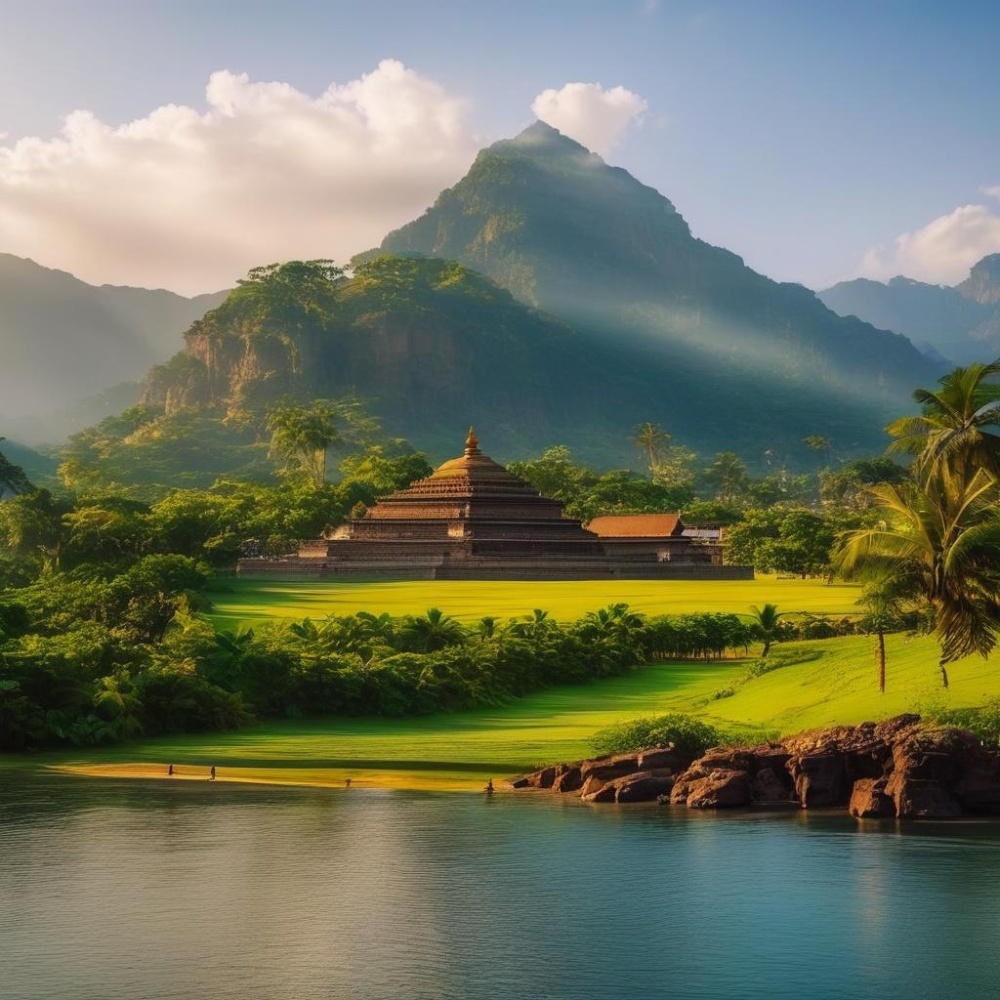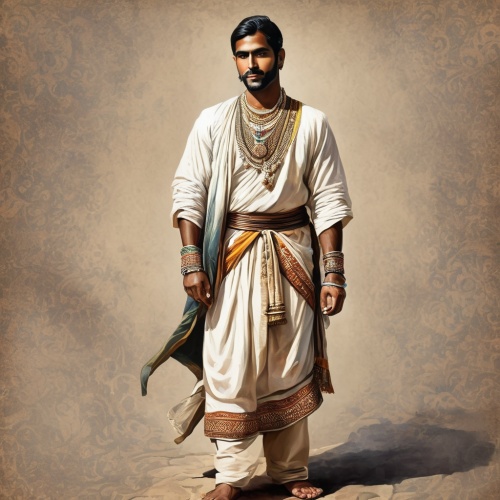Understand
Buddhism, a non-theistic religion founded around 400-500 BC by Sakyamuni Buddha, holds a rich history and profound teachings. The roots of this faith can be traced back to Lumbini, where Prince Siddhartha Gautama, the future Buddha, was born. Abandoning a life of luxury and privilege, he sought a path that would liberate all beings from suffering. After years of searching, he achieved enlightenment under the bodhi tree in Bodh Gaya. The Buddha's teachings, encapsulated in the Four Noble Truths, were first shared at the Deer Park in Sarnath. Buddhism flourished in India for centuries, supported by influential rulers such as Emperor Asoka the Great. However, a devastating blow came in 1193, when attackers destroyed the renowned Buddhist center of learning in Nalanda. By the end of the 12th century, Buddhism had vanished from the lowlands, but continued to thrive in the Himalayan regions. Philosophically and religiously, Buddhism can be classified into two main schools: Theravada and Mahayana. The former emphasizes personal liberation from suffering and has spread to countries like Thailand and Sri Lanka. On the other hand, Mahayana, prevalent in China, Japan, Korea, Taiwan, Bhutan, and Tibet, focuses on the liberation of all sentient beings. Tibetan Buddhism, also known as Vajrayana, is a form of Mahayana Buddhism that diverges in practice rather than ideology. Regardless of the school, wisdom and compassion lie at the heart of Buddhist philosophy, rejecting the concept of religious conversion. Karma, the law of cause and effect, serves as the cornerstone of Buddhist beliefs. It is seen as the creator of the illusory universe known as samsara. While Buddhism faced adversity throughout its existence, it remains a powerful force, guiding individuals towards a path of enlightenment and liberation from suffering. The timeless teachings of the Buddha continue to resonate across the world, offering solace and wisdom to those seeking spiritual enlightenment.
Understand
Hinduism is one of the oldest religions in the world and has a rich history in the Indian subcontinent. Central to Hindu philosophy is the concept of dharma, or truth, which guides the beliefs and actions of followers. According to Hindu beliefs, all living beings have a soul called an atma, which can be reborn multiple times. The karma, or actions, of a person in one life determine their fate in the next. While Hinduism can seem complex with its many gods, they are all ultimately considered different forms of the supreme spirit, Brahma the Creator. The most important incarnations are Vishnu the Preserver and Shiva the Destroyer. These gods are worshipped in elaborately decorated temples called mandirs or Devalayas. Each temple has priests who perform prayers and rituals known as puja. One of the holiest sites for Hindus is the Ganges river, believed to wash away sins. Pilgrims flock to the Varanasi and Haridwar ghats to take a dip and collect holy water, known as Ganga Jal, as a blessing. While the majority of Hindus reside in India, Nepal, and Sri Lanka, there are also Hindu communities in North America, Europe, and the Middle East. Nepal is the only Hindu state in the world, with a significant Buddhist minority as well.
Understand
Islam, founded by the Prophet Mohammed in 570 AD, is a religion centered around submitting to the will of God. According to Islamic beliefs, Mohammed received revelations from the archangel Gabriel, affirming that there is only one God, Allah, and that Mohammed was chosen to convey God's teachings to humanity. In the face of resistance, Mohammed and his followers fled to Medina in what is known as the Hijra, marking the beginning of the Islamic calendar. Islam is not just a set of beliefs, but a complete way of life defined by its five pillars: 1. Belief in one God, Allah, and acknowledging Mohammed as His messenger. 2. Praying to Allah five times a day. 3. Giving alms to the poor at least once a year. 4. Fasting from dawn to dusk during the holy month of Ramadan. 5. Making a pilgrimage to Mecca, known as the Hajj, if circumstances permit. Muslims gather in mosques, called masjids, to worship and are called to prayer by the melodic voice of the muezzin. Friday is a particularly important day for Muslims, as they gather in mosques for prayers and listen to the Imam's sermon. This day brings Muslims together, especially in minority Muslim communities. India is home to the second-largest Muslim population globally, with over 150 million Muslims. There are numerous important Islamic sites in India, many of them deeply sacred. Most Indian Muslims adhere to the Sunni sect, with different schools of thought present in different regions. A significant Shia sect is also found in Lucknow and Uttar Pradesh.
Understand
Sikhism originated in the 16th century in Northern India, specifically the state of Punjab. It was founded by Guru Nanak and followed by nine successive Gurus. The core philosophy of Sikhism, known as Gurmat, is based on the teachings of the Gurus. Guru Nanak, born into a Hindu family, believed that rituals and ceremonies divided people and promoted the importance of personal beliefs and actions. The teachings of the Gurus are compiled in the Guru Granth Sahib, the holy book of Sikhism. Sikhs believe in one God who created the universe. Their places of worship, called Gurudwaras, serve as gateways to the Guru. Unlike many other religions, Sikhism does not have priests. Services are conducted by readers called Granthis, who read passages from the Guru Granth Sahib. Members of the congregation are encouraged to speak during services, promoting community involvement. Today, there are over 23 million Sikhs worldwide, with Punjab in India being their heartland. They form a significant majority in Punjab, comprising about 65% of the population. Sikh communities can also be found across India, though they make up a small percentage of the overall population. Sikh migration has led to substantial communities in Canada, the United Kingdom, the Middle East, East Africa, Southeast Asia, the United States, Western Europe, Australia, and New Zealand.
Map & Climate
Popular Foods
 Dish: Butter Chicken (Murgh Makhani)Butter chicken is a rich and creamy curry made with marinated chicken pieces cooked in a tomato-based sauce. The dish originated in the Indian subcontinent and gained popularity in Canada due to the large population of Indian immigrants. It's typically served with basmati rice and naan bread. Butter chicken contains meat – chicken.
Dish: Butter Chicken (Murgh Makhani)Butter chicken is a rich and creamy curry made with marinated chicken pieces cooked in a tomato-based sauce. The dish originated in the Indian subcontinent and gained popularity in Canada due to the large population of Indian immigrants. It's typically served with basmati rice and naan bread. Butter chicken contains meat – chicken.  Dish: BiryaniBiryani is a popular rice dish made by cooking Basmati rice with meat (usually chicken, goat, or fish), vegetables, yogurt, and a blend of spices. It originates from the Indian subcontinent and is often considered the national dish of Pakistan. It's known for its flavorful layers and distinct aroma. Biryani contains meat – primarily chicken, goat, or fish.
Dish: BiryaniBiryani is a popular rice dish made by cooking Basmati rice with meat (usually chicken, goat, or fish), vegetables, yogurt, and a blend of spices. It originates from the Indian subcontinent and is often considered the national dish of Pakistan. It's known for its flavorful layers and distinct aroma. Biryani contains meat – primarily chicken, goat, or fish.  Dish: SamosasSamosas are deep-fried or baked pastry snacks filled with a savory mixture of spiced potatoes, onions, peas, and sometimes meat. They originate from South Asia and have become a popular street food across India. Often served as an appetizer or a quick snack, samosas can be found at roadside stalls, train stations, and even weddings. Samosas can contain meat – typically potatoes, onions, and peas, but some varieties may include meat such as chicken or lamb.
Dish: SamosasSamosas are deep-fried or baked pastry snacks filled with a savory mixture of spiced potatoes, onions, peas, and sometimes meat. They originate from South Asia and have become a popular street food across India. Often served as an appetizer or a quick snack, samosas can be found at roadside stalls, train stations, and even weddings. Samosas can contain meat – typically potatoes, onions, and peas, but some varieties may include meat such as chicken or lamb. 




Comments
NO COMMENTS